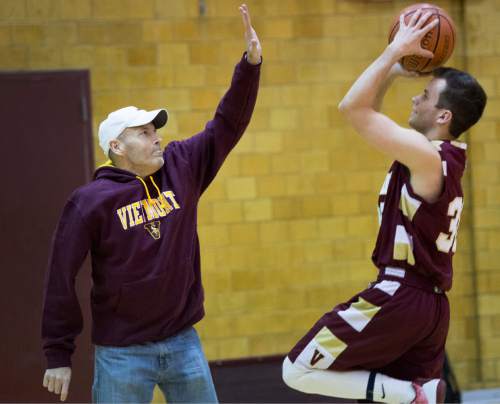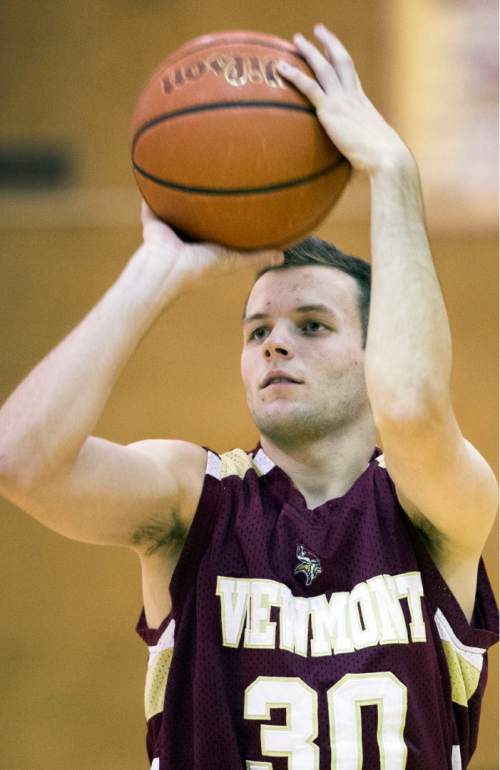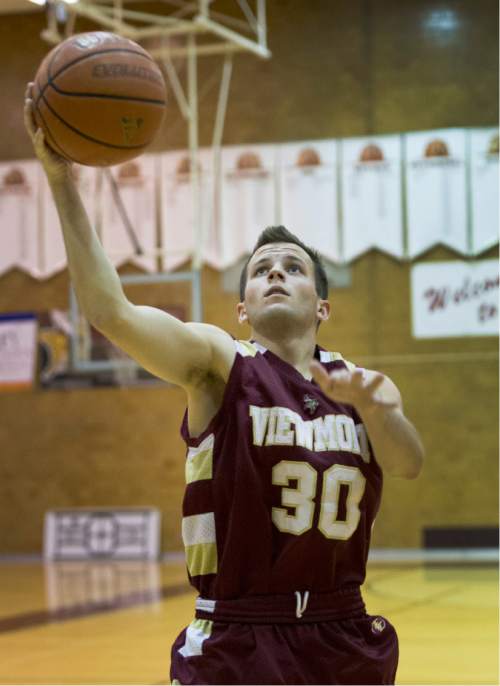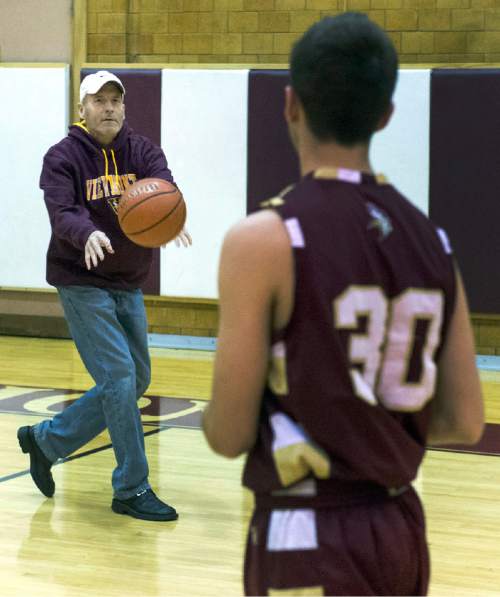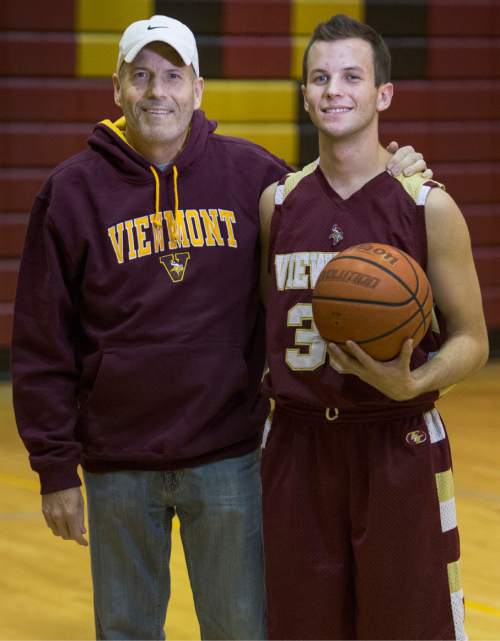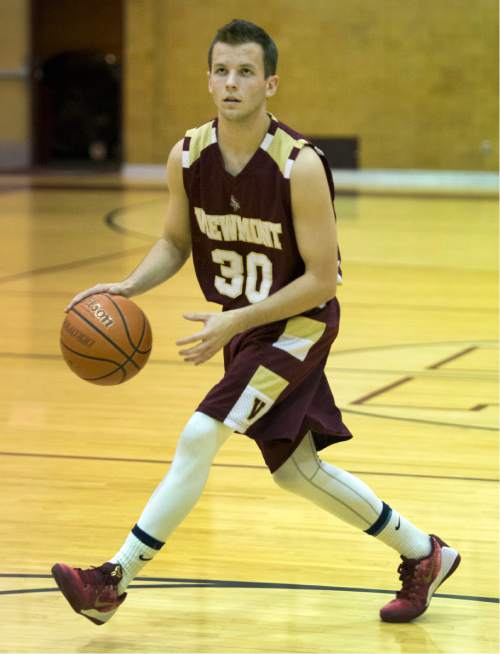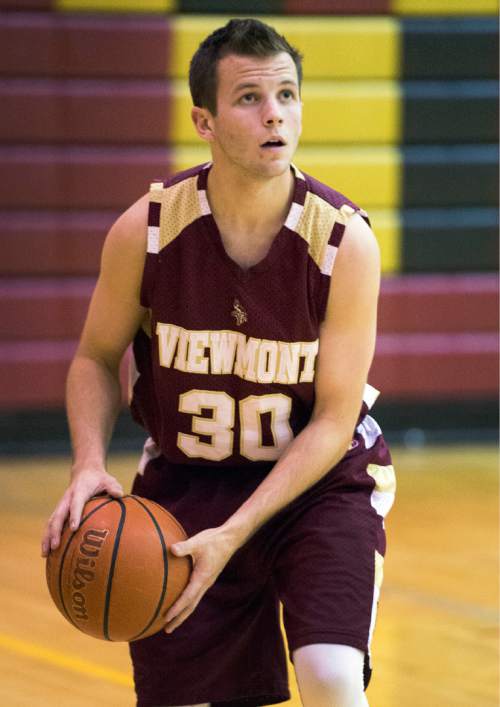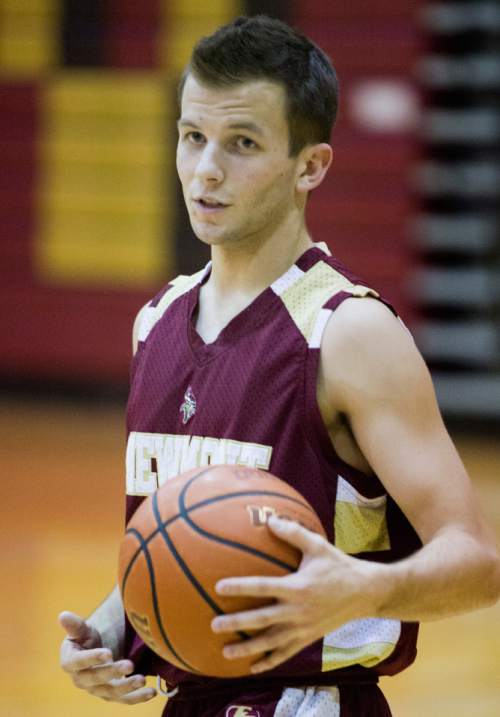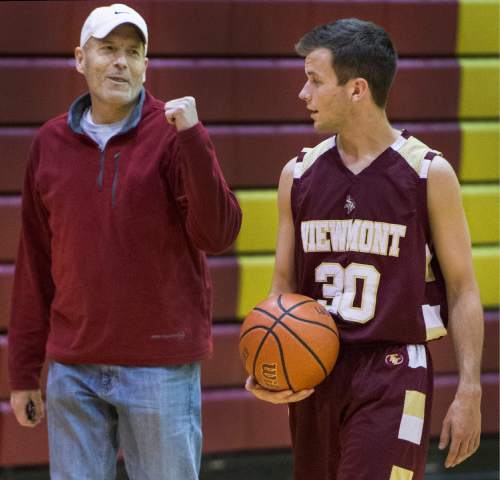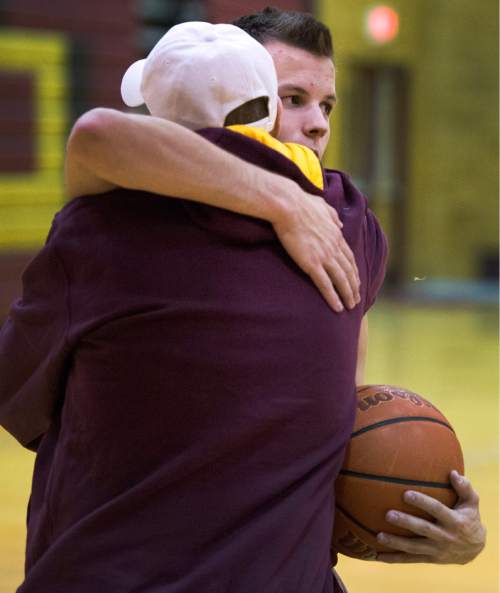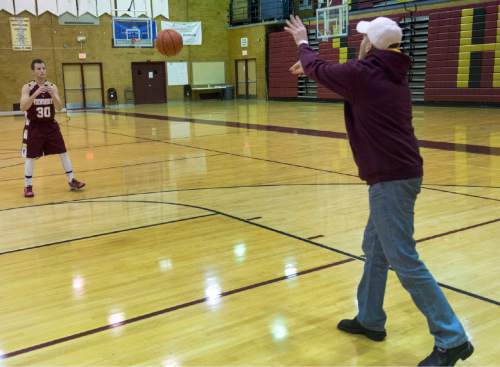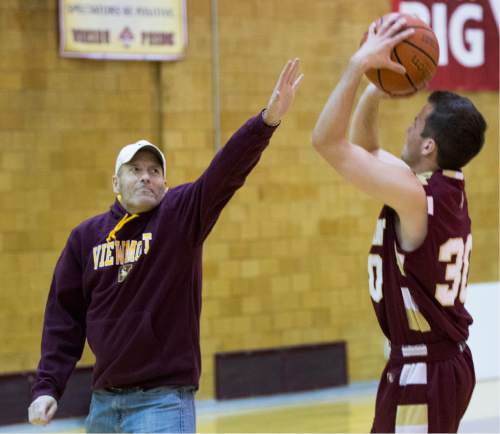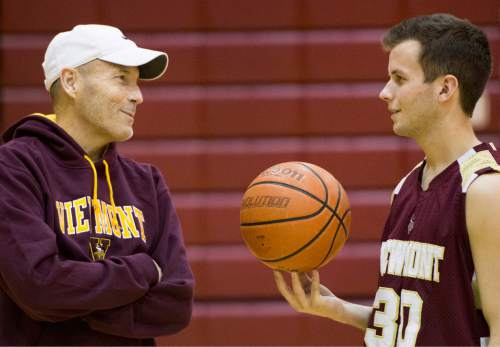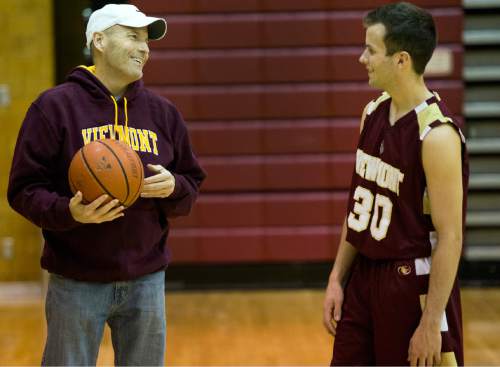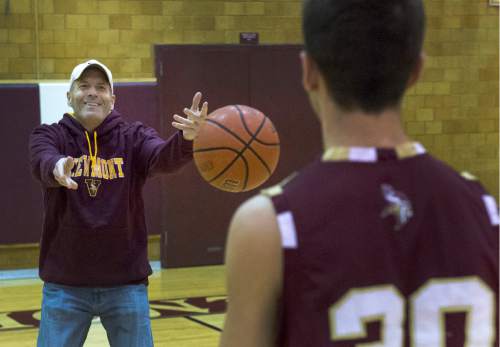This is an archived article that was published on sltrib.com in 2015, and information in the article may be outdated. It is provided only for personal research purposes and may not be reprinted.
Bountiful • Darin Richins doesn't draw attention. There is nothing mysterious about his graying beard or balding scalp. He resembles any other parent while watching his son, Josh, play for Viewmont.
He proudly claps when Josh perfectly finds his teammate for an open 3-pointer. He cheers loudly after Josh himself delivers another triple. Darin is simply another proud father lost in the crowd.
Strangers could never suspect Darin is actually a dying man, hoping to reconcile his relationship with his youngest son. But when Josh's eyes reach his father, he knows this is likely the final season together.
Josh never expected to feel sorrow. Too many times he searched the bleachers, knowing his father wasn't there. For so much of his life — birthday dinners, the day he made varsity, or the night of his first school dance — Darin was missing.
"He's never met one of my dates," Josh said.
Yet tonight, as Josh envisions the end of his father's life — Darin has been diagnosed with kidney failure — his posture tightens and his voice softens. Josh understands his father's impending death will be harder than he ever imagined.
"There's mixed emotions," Josh says. "Sometimes I get frustrated with him, and then sometimes I feel sympathy for him. There's no justifying what he's done, but I feel I could do better with my effort toward him."
As the third of three sons to play for Viewmont, Josh recognized an opportunity to improve their relationship. Basketball has always impacted his life, so he invited his father to finally be a part of it.
"I have seen nothing but love for his dad," Josh's mother, Marilee, says. "He's very concerned about making the most out of whatever time is left."
—
Yearning for a father • Fifteen years have passed since Darin and Marilee Richins separated after an 11-year marriage. Josh was just 2. Raised in a house comprised primarily of women, Marilee caravaned her four sons, each two years apart, from California back to Davis County, where most of her siblings lived.
"I was terrified to raise boys," she explains. "I wanted to get close to family."
As Josh watched his mother juggle multiple jobs to provide for children deprived of a constant fatherly influence, Darin battled demons that dissolved his marriage and attacked his existence from afar.
An occasional appearance from Darin didn't lessen Josh's pain. The feelings of abandonment remained, from knowing his father would never stay, or worse, wondering whether he'd show up high. Josh usually recognized when Darin was wired — normally he kept to himself. But one time, Darin snapped, grabbing Josh's shirt violently after he refused to attend a BYU football game with him. Police were forced to intervene, and Josh sought professional help from that traumatic experience.
Mostly, though, Josh simply wished for what his teammates had — the presence of a father — to coach him in athletics and life.
"That wasn't in the cards for him," Marilee says.
Extended family, neighbors and coaches filled parts of the void, but it wasn't the same. So when the phone call interrupted a conversation between the brothers in April, the siblings fell silent, unsure of what to feel.
Their father was dying.
"We thought we should be sad," Josh says, "but it wasn't there."
Darin nearly died of complications from terminal kidney failure, but was mistakenly revived. If it had been up to him, at the time, everything would have ended that night. Already suffering from another chronic illness, Darin filed a DNR (do not resuscitate) order that someone misplaced — the only reason he is alive today.
Darin laughs and admits now to acting too hastily, but only a few months ago, he felt there was little to make life worth living.
Nearing his 50th birthday, Darin's body is skinny and feeble, resembling that of a much older man. He gets dialysis treatment three times a week. His voice is delicate and rickety. The exact cause of his kidney failure is unknown, but family suspicions point to Darin's past drug abuse.
"I went through some dark times as a single dad, being alone and lonely," Darin explains. "In an attempt to not face it, I experimented with drugs. I'm not proud of it. Did I learn from it? Hell yes."
How many remaining days Darin has left is anyone's guess. Marilee estimates six to eight months, but a simple cold could prove fatal with his depleted immune system.
"He has good times and bad times," she says. "That roller coaster is hard, but it's the nature of this beast."
Darin hopes to be listed for a kidney transplant next spring without any guarantee he will live to see the day — an unintended example for Josh to learn through his father's choices.
"Believe it or not, he taught me," Josh says. "I have no desire to do anything he did. I have no temptations. I'm frustrated with his decisions, but I'm thankful at the same time."
There is always regret, Darin says, but a death sentence was an awakening he needed. There is still time, limited or not, to strengthen his relationship with each of his sons — particularly Josh, who is the most impressionable as the youngest child.
"I'm never too old to apologize, or to say that I could have done better with something," Darin says. "I'm not above saying, 'Gosh, Josh. I'm sorry.'"
—
Basketball as therapy • Josh is shooting baskets inside a church gym in Centerville. Here he is alone and unbothered. Only 18 years young, he discovered basketball as a therapy to mend life's bruises many years ago. It's still his antidote.
"On the basketball court, he is the same as everybody else," Marilee says. "Any differences he perceives that have come about because of his family situation disappear."
Josh found his talent in solace; soothing his troubled thoughts while developing his game. In practice, his shooting partner asks for advice: "Square your shoulders," Josh replies.
Nothing else ever mattered on the court. But as his father's inevitable fate approaches, basketball has evolved into their common foundation.
"I want him to see me play because it might be his last time," says Josh, crediting his father's effort to schedule lunches and attend games. "… He probably feels it's long overdue, but in my perspective it's just in time. He deserves it. He's definitely tried these last few years. I want to repay him for that."
Putting aside years of harbored ill feelings, Josh reached for his phone. He poured in 18 points in Viewmont's season opener the night before — more than he scored his entire junior year — and he wanted to share the details with his father. Instead he asked Darin if he'd come to the rest of his games.
"I've learned to start forgiving him," Josh said. "I've held anger in for 16 years. I'm tired of it."
Marilee embraces Darin when he arrives at Highland a few days later. They've rekindled a friendship, too, realizing that relationships are more important than pride.
"It's good to see you," she says gently. Their faces radiate as the Vikings begin warm-ups. Tonight, basketball has brought a family together again.
"It's very important to make peace with everything that has happened," Marilee says. "It's a great thing for both of them."
Josh finds his parents in the bleachers after the introductory lineups. A warm smile appears following every basket, and his eight points help Viewmont earn its second win to start the season.
Basketball is different these days. It doesn't have to be Josh's escape anymore, which is why he decided to tell his family he's dedicating his final season to the people who mean the most to him, including his father.
"My family is one of a kind. We all faced this trial and stuck together," says Josh. "I thought I would give him something he loves, and play for him."
—
'Love you' • The phone rings. The Utah Jazz dropped another game, and Darin is curious to hear Josh's analysis. They're talking more openly now, once or twice per week.
"Love you," Darin says.
It's his way of saying goodbye; never wanting any of his children to hear anything other than his affection, should his words be the last he speaks. For years, Darin questioned if the feeling was mutual, or if when Josh returned the sentiment it was simply a courtesy.
Not anymore.
"If he hasn't fully meant it in the past, it's OK. He's not in trouble; there's nothing wrong with that," Darin says as his legs begin to tremble and tears soak his cheeks. "But as a father and as a man and as a human being, there's nothing more gratifying when you have someone close to you tell you they love you, and you know that they mean it."
Practice has long been over when Darin greets Josh with a two-armed hug in Viewmont's empty gym. The Vikings are 3-3 now, and following another health scare earlier in the week, Darin has improved enough to make the hour-long drive from Orem.
As Josh shoots from the perimeter, Darin calls the statistics: "3 for 5," he shouts, returning the rebound.
"Three in a row gets you a milkshake," Darin challenges. Seven straight whip the net before Josh playfully backs his father down into the post, banking in a layup off the glass. Mixed within the ensuing laughter is the father-son relationship they've always wanted. They just needed basketball to realize that love — not death — can heal all wounds.
Twitter: @trevorphibbs —
About Josh Richins
Team • Viewmont
Position • Guard
Age • 18
Ht/Wt • 5-foot-11/165 pounds
Birthplace • Orem
Noteworthy • Maintains cumulative 3.6 grade-point average with several advanced placement courses. … Favorite NBA team is the Philadelphia 76ers. … Has started all 12 games for Viewmont in his senior season, averaging slightly more than six points per game. … Richins is the third member of his family to play for the Vikings, and after graduation he is interested in studying pharmaceutical science in college.


